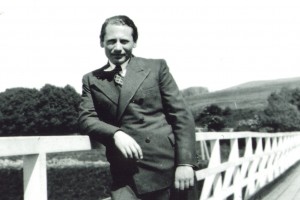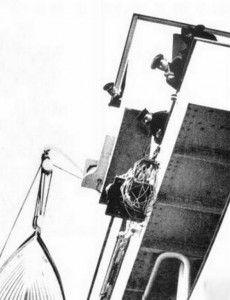In his riveting profile of Don Isaac Abravanel, acclaimed historian Benzion Netanyahu wrote about an encounter the Middle Ages statesman and philosopher had with Spain’s Queen Isabella, on the eve of the expulsion of the Jews from that country. Netanyahu wrote:
“If Isabella thought that, by measures like expulsion, the Jews could be brought to surrender or extinction, she was greatly mistaken. He pointed out to her the eternity of the Jewish people, that they had outlived all who had attempted to destroy them, that it was beyond human capacity to destroy the Jewish people, and that those who tried to do so only invited upon themselves divine punishment and disaster.”
My goodness, Abravanel “got it.” And Benzion Netanyahu got it.
When I learned early this morning that he died hours before, at his home in Jerusalem, I knew some rarified air had gone out of our world. Benzion, you see, was much like Abravanel and, may I say, Moses, who confronted Pharaoh by telling him that disaster awaited him for his persecution of the people God Himself has etched into his hands.
The elder Netanyahu, who would live to see three sons distinguish themselves in the Jewish state he helped create, taught for a time at Cornell. Yet he lived long and died in Jerusalem, the Holy City of his forefathers. What an other-worldly legacy he leaves!
Known far and wide for his embrace of “Revisionist Zionism,” which to much of the world means “right-wing” Zionism, Benzion had come to Palestine as a 10-year-old, in 1920. His singular life flourished in the place that would become the modern Jewish state.
After his eldest son, Yonatan, was killed commanding the assault force at Entebbe in July, 1976, Benzion and his beloved Cela moved home. When I read Entebbe: The Jonathan Netanyahu Story, written by the youngest brother, Iddo (it remains the best book I’ve ever read), I could see much of the old man in the son(s).
In the book, Iddo recounts the moments before planeloads of Israeli counter-terrorist commandos landed at the African airport. The night-time raid caught PLO terrorists and their Ugandan hosts flat-footed, and the ensuing firefight was over in minutes and the 100+ hostages were loaded onto the planes and flown home to freedom.
As the lead pilot guided his plane through the night, Lt. Col. Yonatan Netanyahu (“Yoni”) made his way to the cockpit.
“If he’s there, I’m going to kill him,” he said matter-of-factly.
“Who?” asked the pilot.
“Idi Amin,” Yoni answered.
The astonished pilot argued that they didn’t have authorization to kill Amin, who was in the middle of a reign of terror as the strongman of the African nation.
Yoni replied that it didn’t matter, that killing Amin would save countless lives, since the fiendish dictator was known for throwing innocents off buildings, or feeding them to crocodiles. In Yoni’s world—a world shaped by a father of uncompromising principles—offing the Butcher of Uganda was the humanitarian thing to do.
I agree.
That Amin missed the party didn’t detract from the spectacular success of the mission. The lone loss, however, was unrecoverable: Yoni Netanyahu was killed while directing the initial assault. His death would alter the family forever.
In his foreword to The Letters of Jonathan Netanyahu, compiled by the fallen commander’s brothers, the novelist Herman Wouk likened Yoni to “an ember of sacred fire,” a person of such unusual abilities and outsized life that the rest of us can only marvel.
Wouk was right, of course. Such a man could only have come into being by sitting at the feet of greatness. Benzion instilled in his sons a love of their own people.
I am often struck by the vapidness of their ideological enemies (oddly enough, a growing number of them in leadership positions in my own American evangelical community). These are people who have been overtaken by the rhetoric of the left and denounce perhaps the most moral initiative in all of human history, Zionism. Interestingly, in a piece on Benzion from the Israeli newspaper Ha’aretz, he was quoted as saying that the left posed an existential threat to Israel and the Jewish people.
This is a very profound statement, and one we would do well to read three or four times.
It isn’t simply that the left is an annoyance, or even an opponent. It is that the pacifist, defeatist—I will also call them immoral—policies of the left endanger all of us.
I think of how the Religious Left in America so loathes people like Benzion Netanyahu. They express displeasure at people who kill enemies in battle. They decry war, as if this last-ditch option is not moral.
It is very moral. And men like Benzion Netanyahu and his sons (each served in the same elite counter-terrorism unit that went to Entebbe) keep the rest of us safe from unhinged, malevolent murderers, many of whom list jihad as their occupation.
Those were the kinds of people the Netanyahu family fought all their lives. How many of us who are old enough to remember felt safer when boarding a plane after Entebbe? How many of us stop to realize what an impenetrable fortress/outpost the Israel Defense Forces brings to the Middle East, thus creating at least a semblance of stability in a region that would be far more dangerous for America, were the Israelis not there?
No, the Religious Left can continue chattering about alleged brutality perpetrated by the Israelis, and call Zionists a bigger threat to peace than Hamas. They are bearing false witness when they do, and History will vindicate the Jews. Men like Brian McLaren and his friends…are not fit to lace the boots of the men and women who make up the IDF.
I have seen the graves in Jerusalem of the 22 young IDF men who died in Jenin in 2002, during an operation to stem the tide of bloody terrorism, unleashed on innocents—the terror campaigns of Hamas. The Israelis sent those men house-to-house to find terror operatives, rather than bomb the city from the air and kill innocents.
Did the Israelis “receive credit” for that? Does the Religious Left think about the 22?
No.
The IDF is the most ethical army in the world, fighting an existential threat every second of every day. Benzion Netanyahu was well aware of this fight.
He was a personal friend. I well remember visiting him for the first time. Evening had fallen and I wondered if I’d come to the right house. Then I saw the side steps, the same steps I’d seen his boys play on in grainy documentary footage. He came to the door and his eyes twinkled.
That first visit was sublime. We sat in the family dining room, where so many profound conversations had taken place in the previous half-century. In the corner was a bust of his fallen son, Yoni. We discussed culture, politics, history. He told me how much the Russians had hated the Jews. How much Europe had hated the Jews. How much the Arabs hated the Jews.
And there we were, enjoying a delightful evening in the Jewish homeland, which still serves as a finger in the eye of Pharaoh, Queen Isabella, and Idi Amin.
The Jewish people are indestructible, more than the stuff of legend. For they are living, breathing, singing, dancing this night—in the City of David.
Goodnight, Benzion.
None of it was in vain.
jim1fletcher@yahoo.com


